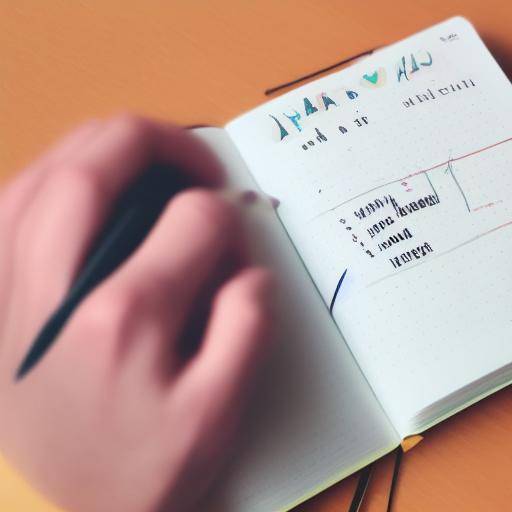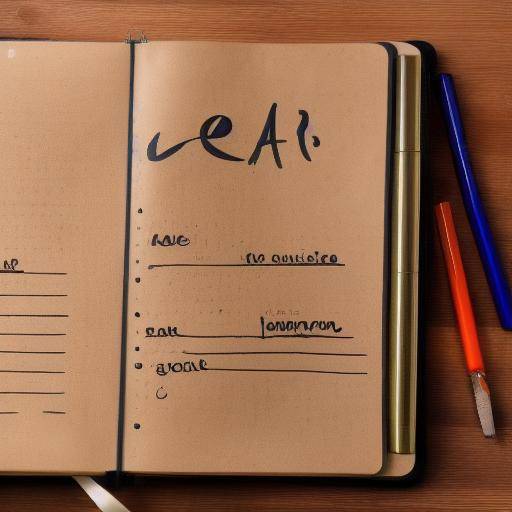
Fear of failure is an emotion that can limit our personal and professional growth. Many people struggle with this paralysing feeling when they try to achieve their goals. However, there are effective strategies to address this fear, and one of them is journaling. In this article, we will explore in detail how journaling can be a powerful tool to overcome fear of failure and promote personal development. From its history and foundation, to practical advice and expert opinions, this article will provide valuable information for those seeking to overcome the fear of failure and grow on their personal development journey.
Introduction
Journaling, or carrying a personal journal, is an ancient practice that has been used by people from various cultural, social and professional fields. The act of writing our thoughts, emotions and experiences not only allows us to express ourselves, but can also have powerful therapeutic and transformative effects in our daily lives. In this regard, journaling has become a popular tool in the field of personal development, particularly in the context of overcoming fear of failure.
History and Foundation of the Journaling
The journaling has its roots in ancient personal writing traditions. From navigators and explorers' journals to the records of daily experiences in literature, personal writing has been a common practice in humanity. However, its conscious application as a tool to face emotional challenges and promote personal growth is a more recent development.
Benefits of the Journaling in Failure to Failure
Journaling has been shown as an effective strategy to address the fear of failure. By writing about our fears, anxieties and concerns, we can explore them in detail, demystify them and find constructive ways to handle them. Furthermore, keeping track of our successes, achievements and moments of overcoming can give us a tangible reminder of our abilities and strengths.
Journaling as a Personal Development Tool
Personal development implies the conscious growth and improvement of oneself, both emotionally, intellectually, spiritually and professionally. In this context, journaling not only directly faces the fear of failure, but also becomes an integral tool for personal growth. By observing our experiences, reflecting on our goals and charting our progress over time, journaling becomes a vital link in our development process.
Practical Tips for Employing Journaling in Personal Development
- Set a regular time to write in your journal.
- Use your journal to set goals and track.
- Be honest with yourself by writing about your fears and worries.
- Reread your past entries to observe your progress over time.
Understanding the Feature and its Impact on Personal Development
Fear of failure can manifest in various ways and have a significant impact on our lives. From avoiding growth opportunities for fear of rejection to self-limiting in pursuit of ambitious goals, fear of failure can be an important barrier in our path to full personal development.
Strategies to Face Fear through the Journaling
- Identify your specific fears and write about them.
- Question your limiting beliefs through the dialogue written in your journal.
- It uses journaling as a tool to generate ideas and solutions to challenges.
- Celebrate your successes and achievements in your journal to strengthen your trust.
Conclusion
In short, journaling is a powerful technique that can help us face the fear of failure and promote our personal development. By exploring our thoughts and emotions through writing, we can gain clarity, perspective, and strength to face the challenges that come our way to our goals. By integrating journaling as part of our personal development journey, we can take advantage of its transformative potential and strengthen our ability to overcome the fear of failure.
Frequently asked questions
1. How can I start wearing a personal journal to face the fear of failure?
Starting to carry a personal journal is simple. Find a quiet moment every day to write about your thoughts, emotions and experiences. By identifying your fears and anxieties related to failure, you can explore ways to approach them through reflective writing.
2. How long should I spend every day at journaling?
There is no strict rule about the time you have to dedicate to journaling. Start with a few minutes a day and then adjust time according to your needs and availability. Consistency is more important than the duration itself, so set a pace that you can keep regularly.
3. Is journaling effective to overcome fear of failure?
Yes, journaling has proven to be an effective tool to address the fear of failure. By writing about your fears, reflecting on your achievements and exploring solutions through writing, you can strengthen your ability to face challenges and expand your personal boundaries.
4. What role does journaling play in the personal development process?
Journaling plays a key role in personal development by providing a mechanism for self-reflection, goal tracking and strengthening emotional self-consciousness. Through personal writing, you can trace your growth, identify areas of improvement and strengthen your trust in yourself.
5. What are some effective journaling strategies to overcome the fear of failure?
Some effective strategies include identifying specific fears, questioning limiting beliefs, generating solutions through writing and celebrating achievements. In addition, establishing a regular method for journaling and maintaining honesty with yourself are key elements for obtaining significant results.
6. What precautions should I take when I implement the journaling to face the fear of failure?
It is important to be aware of your own emotional limits by exploring your fears through journaling. If you feel that writing evokes overwhelming or negative emotions, consider seeking the support of a mental health professional for additional guidance.
With these tips and strategies, you can harness the power of journaling to face the fear of failure and advance your personal development journey. Through regular journaling practice, you can discover new perspectives, strengthen your emotional resilience and develop a more positive and proactive mentality.






















































